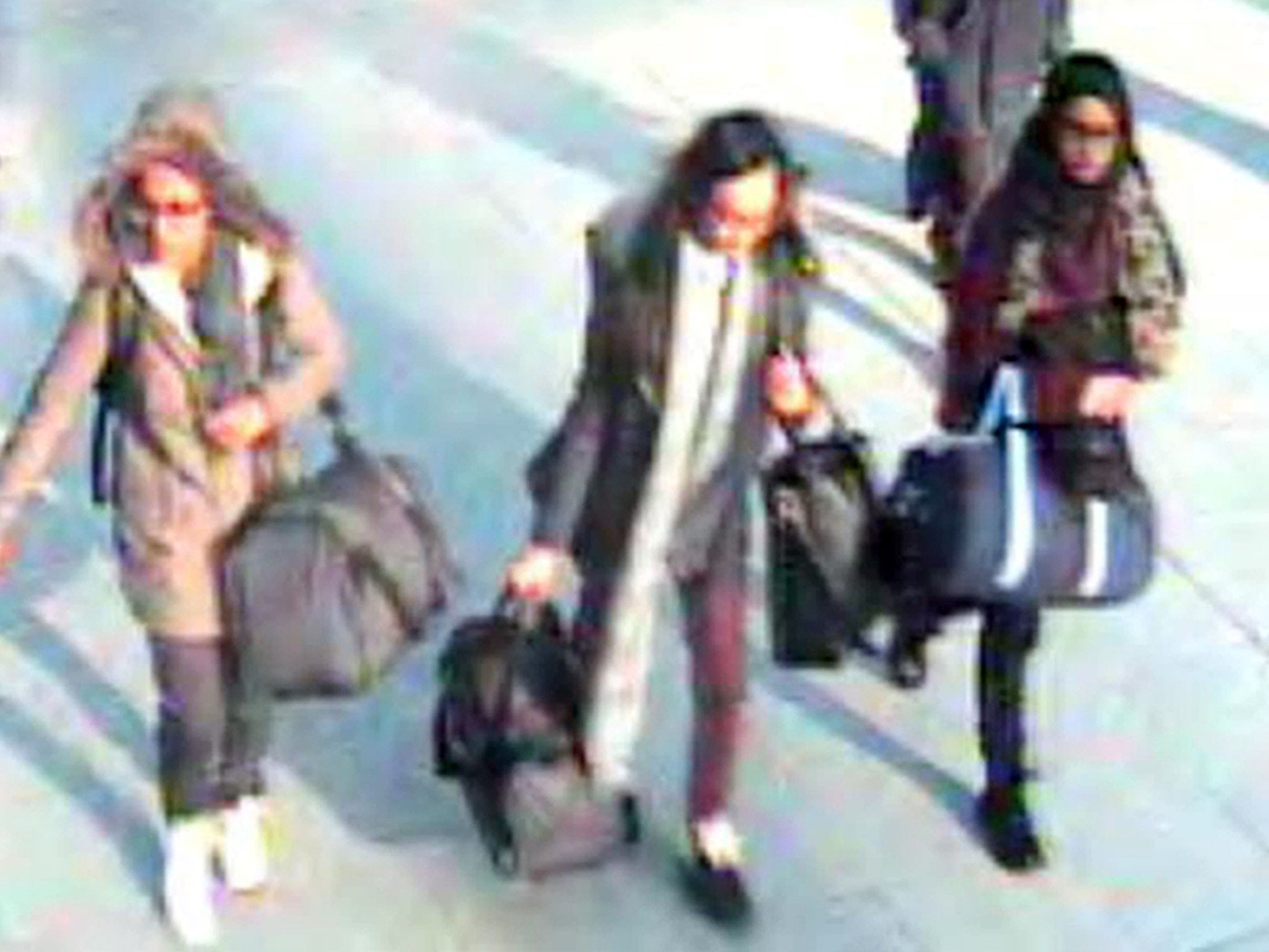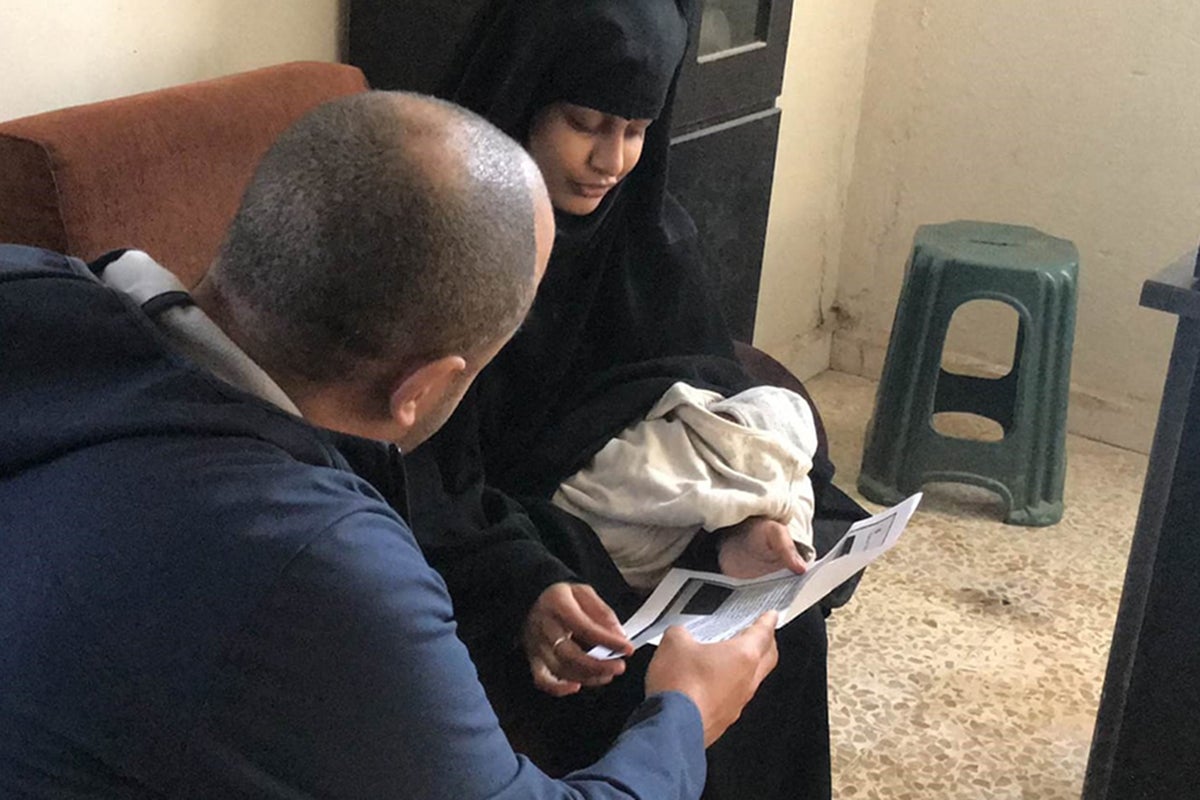Shamima Begum: Police lose legal bid to seize journalists' interview notes with Isis bride
Former Isis member remains in Syria as lawyers appeal citizenship removal
The Metropolitan Police has lost a legal bid to seize unpublished notes made by journalists who interviewed Shamima Begum.
Counterterror officers investigating the captured Isis bride applied for a judge to force media outlets to hand over their material after they refused voluntary requests.
But a judge at London’s Old Bailey rejected Scotland Yard’s application for an order compelling journalists to hand over unpublished notes and footage from interviews in Syria.
The production order, under the Terrorism Act, required officers to prove the material is “sought for the purposes of a terrorist investigation”, is of “substantial value” and that seizure is in the public interest.
The Times, BBC, Sky News and ITN instructed lawyers to resist the application when it was lodged last month.
Gavin Miller told the Old Bailey the order would deprive journalists of their neutrality and place them at risk by making them de facto actors of the state.
“Journalists are believed to be neutral observers and it is this neutrality of the press that affords them protection,” he added.
Scotland Yard dropped its action against Sky News at that hearing but proceeded against the other three outlets.
Judge Mark Dennis QC ruled that none will be required to hand over material.
He called The Times report that revealed Begum had been captured a “significant public interest story which has opened up an important issue for public debate”.
“The work of investigative journalists, in particular, does rely upon trust, confidentiality, protection of journalistic material and sources, their perceived neutrality, and the cooperation of people who are prepared to place their trust in journalists,” he added.
Judge Dennis said that Begum had spoken openly and knew her words would be published, but “the purported interference remains and has a wider potential impact for journalists and cannot be simply discounted in the face of competing public interest in pursuing the police investigation”.
He ordered that copies of all the material remain with a firm of solicitors with until further order from the court, to prevent it being lost.
Judge Dennis said that if Begum were to return to the UK, a fresh application could be considered but there was no “pressing need” for police to currently access the material.
A lawyer representing Begum’s family told The Independent he believed police were “building a case against her”.
She was interviewed by journalists after being detained alongside other Isis families by Kurdish forces in Syria.
Begum travelled to the terrorist group’s strongholds aged 15 with two school friends from Bethnal Green and married a Dutch Isis fighter.

They had three children but all died, including a baby boy born in the al-Hol camp earlier this year.
Begum gave birth days after being tracked down by The Times war correspondent Anthony Loyd, and later gave interviews to other media outlets including ITN and Sky News.
She appealed to be allowed to return to the UK and claimed she was merely a “housewife”, but sources claimed she had been a member of Isis’s feared morality police.
Mr Loyd, who was in court for the ruling, told the Press Association Scotland Yard’s application had “serious implications” for press freedom.
“I understand the legality and legitimacy of the police investigation, but I totally resent being co-opted into that as a journalist by a police force that would not send officers itself to interview Begum,” he added.
John Battle, head of compliance at ITN, called the ruling a “victory for journalism”.
“Judge Dennis clearly recognised that the journalism was of the highest public interest obtained in difficult and dangerous circumstances,” he said.
“The judge also accepted that journalism relies on the journalist being neutral, independent and sources being respected and this is an important precedent.”

A spokesperson for the Metropolitan Police said it fully respects the media's independence.
The police will, when appropriate, seek a production order in situations where that material is not provided voluntarily,“ he added.
“We respect Judge Mark Dennis QC’s ruling in this case and are pleased that his honour recognised the material we requested would be of substantial value to a counter terrorism investigation. We were also reassured by his request that the material be retained by a solicitors' firm, in consideration of the possibility that a further production order may be sought in the future.”
Ms Begum is among high-profile Isis members to have been stripped of their British citizenship and has called for the government to repatriate her to Britain.
Official guidance states that the home secretary can deprive citizenship for the “public good” if a person can apply for alternative nationality, but Bangladeshi officials said Begum was not a dual national and would not be allowed to enter the country.
Her lawyers are taking the case to the Special Immigration and Appeals Commission, which previously found the decision to remove British citizenship from two alleged Islamists of Bangladeshi heritage unlawful.
Sajid Javid said he used the controversial powers to “protect the country” and prevent them from returning to the UK.
The UK has so far refused to repatriate captured British Isis fighters to face trial, despite mounting international pressure and pleas from Kurdish officials in Syria.
A Home Office source told The Independent that the government’s position on detained British jihadis has not changed since Mr Javid was replaced by Priti Patel in Boris Johnson’s government.
Only one in 10 of more than 400 jihadis who have already travelled back from Syria have been prosecuted and the government has introduced a suite of new terror laws aiming to make the move easier.
A report released earlier this year by the UN Security Council warned that reductive “jihadi bride” stereotypes were causing female Isis members to be dangerously underestimated by security services.
It called on the UK and other member states to recognise the “many different roles, including as supporters, facilitators or perpetrators of terrorist acts” that women play, adding: “The gendered assumption that women lack agency can have serious security implications by letting dangerous actors slip through the cracks.”

